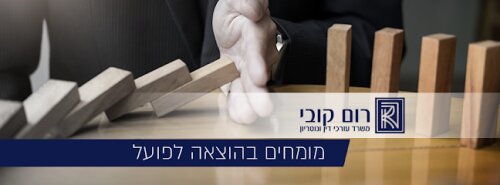Best Bankruptcy Lawyers in Ramat Gan
Share your needs with us, get contacted by law firms.
Free. Takes 2 min.
List of the best lawyers in Ramat Gan, Israel
About Bankruptcy Law in Ramat Gan, Israel
Bankruptcy in Ramat Gan, like the rest of Israel, is governed by national laws designed to help individuals and businesses manage unmanageable debt. The main legislation guiding bankruptcy matters is the Insolvency and Economic Rehabilitation Law, 5778-2018. Residents of Ramat Gan can seek debt relief through various procedures, including debt settlement, receivership, and liquidation. The goal is to protect the debtor from ongoing collection efforts while ensuring creditors receive a fair distribution of any available assets.
Why You May Need a Lawyer
Facing bankruptcy can be overwhelming, both emotionally and legally. Here are some situations where legal assistance becomes crucial:
- You are unable to pay your debts and want to understand your options.
- You have received notices from creditors or legal action has commenced against you.
- You want to propose a payment plan or debt settlement.
- You are at risk of losing property or business assets.
- You are unsure about your rights and obligations during debt collection or insolvency proceedings.
- You need representation in court or before the Insolvency Commissioner.
A lawyer can help navigate the complex legal process, ensure your rights are protected, and increase your chances of achieving debt relief or business recovery.
Local Laws Overview
The main legal framework for bankruptcy in Ramat Gan is the Insolvency and Economic Rehabilitation Law. This law applies nationwide but is administered locally through district courts and the office of the Insolvency and Economic Rehabilitation Commissioner.
Key aspects include:
- Automatic Stay - Once insolvency proceedings begin, collection activity against the debtor is suspended, giving them time to reorganize or liquidate assets in an orderly way.
- Types of Proceedings - Options include individual bankruptcy, corporate insolvency, debt settlement arrangements, and receivership.
- Rehabilitation Options - The court may approve a structured repayment plan, allowing some debtors to retain certain assets.
- Discharge of Debts - In many cases, debtors can be released from further liability once the process concludes and a discharge is granted.
- Creditors' Rights - Creditors may submit claims and participate in creditors' meetings to vote on arrangements.
- Role of Trustees - Court-appointed trustees oversee asset management and negotiation between parties.
Each case is different, so it is important to receive tailored legal advice that accounts for your specific circumstances in Ramat Gan.
Frequently Asked Questions
What is the difference between bankruptcy and insolvency in Israel?
Insolvency is the general state of being unable to pay debts when due, while bankruptcy refers specifically to a legal process for individuals who cannot pay what they owe.
How do I begin bankruptcy proceedings in Ramat Gan?
You can apply through the Insolvency and Economic Rehabilitation Commissioner by submitting a petition along with required documents and financial disclosures. A lawyer can assist with preparation and filing.
Will bankruptcy affect my credit score?
Yes, entering bankruptcy will negatively affect your credit rating and can make obtaining loans more difficult in the future. However, it also provides a fresh start after legal discharge of debts.
Can I keep my home or car if I declare bankruptcy?
Some assets may be protected, depending on your case, the value of the assets, and whether they are essential for living or working. The court and trustee decide what can be retained.
How long does bankruptcy take in Israel?
Proceedings can last from several months to a few years, depending on the complexity and whether you propose a settlement plan. Discharge is typically granted after a minimum period prescribed by law.
What debts are not discharged in bankruptcy?
Certain debts like fines, child support, and some tax obligations may not be written off. Legal advice is important to review which debts will remain after discharge.
Can bankruptcy protect me from all creditors?
After proceedings start, most collection actions are halted, but certain claims or legal actions may continue with court approval.
What are my alternatives to bankruptcy?
You might be able to negotiate a private settlement, apply for a court-approved debt arrangement, or consolidate your debts, often with the help of a legal professional.
What happens to my business if I go bankrupt?
If your business is a separate legal entity, insolvency procedures may involve restructuring, selling assets, or liquidating the business, depending on viability and creditor interests.
Do I need a lawyer for bankruptcy in Ramat Gan?
It is not mandatory, but given the complex paperwork, negotiations with creditors, and court processes, professional legal assistance is strongly recommended.
Additional Resources
Several resources are available for those considering bankruptcy in Ramat Gan:
- Office of the Insolvency and Economic Rehabilitation Commissioner (Halon Nesiga veShikum Kalkali) for applications and public guidance
- Local District Courts handling insolvency cases
- Legal Aid units and nonprofit organizations focused on financial rehabilitation
- Consumer Protection Authority for advice on dealing with creditors
- Bar Association of Israel for referrals to qualified bankruptcy lawyers in Ramat Gan
Next Steps
If you are facing significant debt or have received legal notices regarding debt collection, it is important to act promptly. Here is how you should proceed:
- Gather all relevant documents, including financial statements, creditor correspondence, and court notices.
- Contact a lawyer who specializes in bankruptcy law in Ramat Gan for an initial consultation.
- Discuss your financial situation and explore all possible options, including restructuring debts, settlement, or formal bankruptcy proceedings.
- Follow legal advice carefully and cooperate in providing documentation and information.
- Stay informed at each stage of the process and participate actively in meetings or court hearings as required.
Early legal intervention can protect your assets, minimize risks, and set you on a path to financial recovery. Do not wait until creditors initiate aggressive action before seeking help.
Lawzana helps you find the best lawyers and law firms in Ramat Gan through a curated and pre-screened list of qualified legal professionals. Our platform offers rankings and detailed profiles of attorneys and law firms, allowing you to compare based on practice areas, including Bankruptcy, experience, and client feedback.
Each profile includes a description of the firm's areas of practice, client reviews, team members and partners, year of establishment, spoken languages, office locations, contact information, social media presence, and any published articles or resources. Most firms on our platform speak English and are experienced in both local and international legal matters.
Get a quote from top-rated law firms in Ramat Gan, Israel — quickly, securely, and without unnecessary hassle.
Disclaimer:
The information provided on this page is for general informational purposes only and does not constitute legal advice. While we strive to ensure the accuracy and relevance of the content, legal information may change over time, and interpretations of the law can vary. You should always consult with a qualified legal professional for advice specific to your situation.
We disclaim all liability for actions taken or not taken based on the content of this page. If you believe any information is incorrect or outdated, please contact us, and we will review and update it where appropriate.









